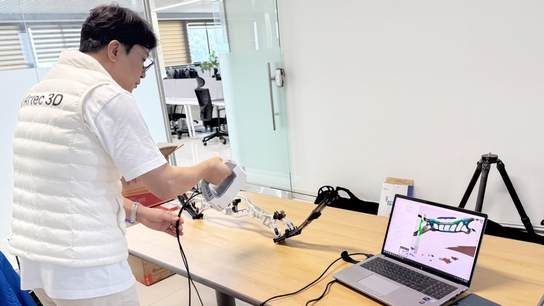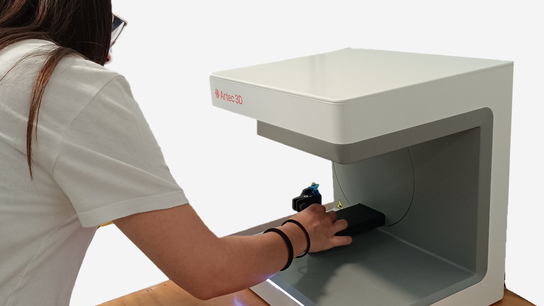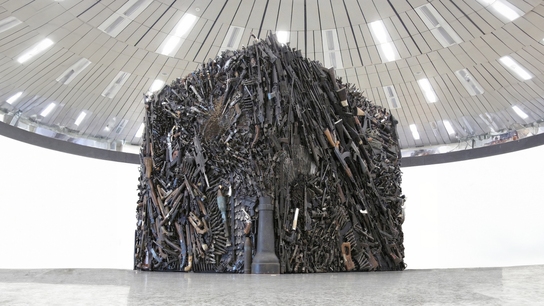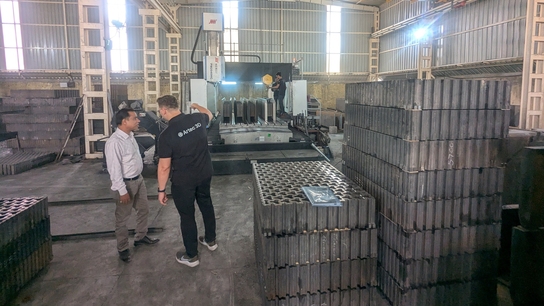Kazu Hiro’s breathtaking special effects makeup with Artec 3D scanners
Challenge: An Academy Award-winning special effects makeup artist needed to find a better way to lifecast actors than via the traditional silicone-based process.
Solution: Artec Leo, Artec Space Spider, Artec Studio, ZBrush
Result: No longer do actors need to sit perfectly still for 20-30 minutes with their faces smothered in silicone. In just 1-2 minutes, their faces or other body parts are 3D scanned with Leo and Space Spider, capturing everything down to the finest wrinkles and tiniest pores.
Why Artec 3D: The compact and fully portable Artec 3D scanners make it possible to create incredibly lifelike lifecasts that can be 3D printed and sculpted to perfection in a fraction of the time that traditional methods demand.

Kazu Hiro in his studio, scanning model Jack Currier with Artec Leo. Image courtesy of Kazu Hiro
Kazu Hiro, renowned for his remarkable makeup artistry, has sculpted the faces of Hollywood’s elite, masterfully transforming them into unforgettable characters on the silver screen.
From the recent run of Oscar-nominated films, Hiro worked with A-listers such as Bradley Cooper and Robert Downey Jr. for 2023 hit Maestro. His previous work includes blockbusters such as Bombshell, Darkest Hour, Salt, The Curious Case of Benjamin Button, Men in Black II, How the Grinch Stole Christmas, and other top movies.
Hiro’s carefully cultivated talent has been recognized numerous times, including with multiple Academy Awards for Best Makeup and Hairstyling, BAFTA Awards, and various other accolades.

3D-printed Leo HD Mode and Space Spider scans. Image courtesy of Kazu Hiro
With his seemingly tireless goal of perfection, Hiro constantly strives to advance his mastery of special effects makeup artistry to new heights, which means always being on the lookout for new ways to enhance his design and creation workflow.
The special effects makeup and fine art of Kazu Hiro
Lifecasting, a cornerstone of Hiro’s makeup artistry for years, is a detailed process of creating a three-dimensional copy of a living human body, regularly called upon in the movie industry to achieve high levels of realism in character makeup.
This meticulous method starts with preparing the subject and gathering the necessary materials, including silicone rubber.
Despite its advantages, such as being relatively affordable, capturing fine skin details, and creating a durable, reusable cast, traditional lifecasting has several downsides. First of all, the process is often time-consuming and messy, uncomfortable at best, and sometimes even bringing on claustrophobia in the actor.
What’s more, distortions in the final cast can arise due to the weight of the mask pulling down on the face, or the actor’s involuntary movements as they’re forced to sit still for so long, either of which can drastically affect the end results.
Turning towards 3D scanning
Hiro’s journey for a better solution to traditional lifecasting led him to the world of 3D scanning, and ultimately to his local Artec Ambassador Rapid Scan 3D. Here, he met Chris Strong, a recognized 3D scanning expert in the movie industry and beyond, who introduced Hiro to the Artec Space Spider.

Silicone nose cast, undercuts treated, ready for scanning with Artec Space Spider. Image courtesy of Kazu Hiro
A long-standing favorite among creatives and engineers alike, the Space Spider is an ideal tool for CGI work, owing to its ultra-high-resolution capabilities and the potential to capture every minute detail of an actor’s face in color 3D with jaw-dropping precision.
The Space Spider brought about an immense shift in Hiro’s workflow. He was able to let go of the messy and uncomfortable traditional lifecasting process, switching to non-contact 3D scanning without sacrificing anything when it comes to realism.
For capturing fine details, such as the tiniest wrinkles around the eyes, pores, and minute facial contours, Hiro now turns to the Space Spider.
For capturing larger aspects of an actor like the overall head, neck, and body, Hiro uses the Artec Leo. Its high FPS capture rate, wide field of view, ease of use, and wireless capability make it ideal for broader scans, along with the rich detail made possible with Leo’s HD Mode.

Detail capture comparison: Model of Robert Downey Jr. made with photogrammetry (left) and Artec Space Spider and Leo (right). Image courtesy of Kazu Hiro
The 3D scanning process takes a mere 1-2 minutes, drastically faster than the 20-30 minutes required for traditional lifecasting. And, unlike many 3D scanners, Leo and Space Spider are entirely non-contact, requiring no targets or markers, thereby eliminating any chance of discomfort.
Crucially, these two scanners integrate seamlessly in Artec Studio. Multiple 3D scans from both the Leo and Space Spider import into the same workspace with one click, allowing Hiro to create the most detailed, comprehensive 3D models of an actor’s face, head, neck, and body.

Combined Leo HD Mode and Space Spider scans of Sean Penn. Image courtesy of Kazu Hiro
For the CGI and film industry, scanning on location at a moment’s notice has become a reality, what with Leo’s portability and ease of use, and Space Spider’s stunning dedication to every detail. And for each and every project, the final result is a vividly lifelike digital replica that serves as the perfect blueprint for Hiro’s extraordinary makeup transformations.
“Kazu’s work is second to none, and his quest for perfect representation called for an equally superior tool. The Artec Leo’s accuracy, ease of use, and portability all made it the right fit. I confidently recommended it to Kazu, knowing it would transform his craft and elevate the quality of his work,” said Chris Strong, a 3D scanning specialist at Rapid Scan 3D.
Turning 3D scans into true-to-life special effects makeup
The actual transformation from 3D scan to makeup prosthesis is an exacting process. Following scanning, Hiro turns to Artec Studio, an innovative software solution for 3D scan data processing, with a rich toolset to optimize and refine the 3D scans of the actor, enhancing every minute detail for the most accurate representation.
From Artec Studio, Hiro exports the 3D scans to ZBrush, where he puts the finishing touches on the 3D model of the actor’s face, head, or other body part, after which he 3D prints the lifecast and then physically sculpts it with clay.

Combined Leo HD Mode and Space Spider scans in ZBrush. Image courtesy of Kazu Hiro
Application of the prosthesis is an art in itself. Each piece, built upon the detailed realism of the actor’s face or other body part, as captured by the Leo and Space Spider, is carefully applied and fixed to the actor’s skin, creating a seamless transition that blurs the line between reality and fantasy.

3D print from neck mold scan made with Artec Leo HD Mode and Space Spider. Image courtesy of Kazu Hiro
Throughout the filming process, Hiro monitors the prostheses, ready to make adjustments or replacements anytime. By integrating the Artec 3D scanners into his workflow, Hiro has reinvented the art of special effects makeup creation, synergizing technology and painstaking craftsmanship to an unprecedented degree.
The impact of 3D scanning on Hiro’s work
Hiro said, “The Artec Leo and Space Spider have altered my work profoundly. This technology gives me an exceptional level of detail, without the distortions or actor discomfort that might arise during traditional lifecasting.”
He continued, “These scanners have been more than just tools for me. They are truly groundbreaking in the arena of special effects makeup.”

3D-printed bust of Richard Krueger, from Leo HD Mode and Space Spider scans. Image courtesy of Kazu Hiro
As an avant-garde in the industry, Hiro eagerly anticipates the future of his craft. He said, “I look forward to the new advancements that Artec will bring to 3D scanning technology. These innovations will continue to push the boundaries, allowing me to further enhance my Hollywood makeup work as well as my fine art sculptures.”
Scanners behind the story
Try out the world's leading handheld 3D scanners.






